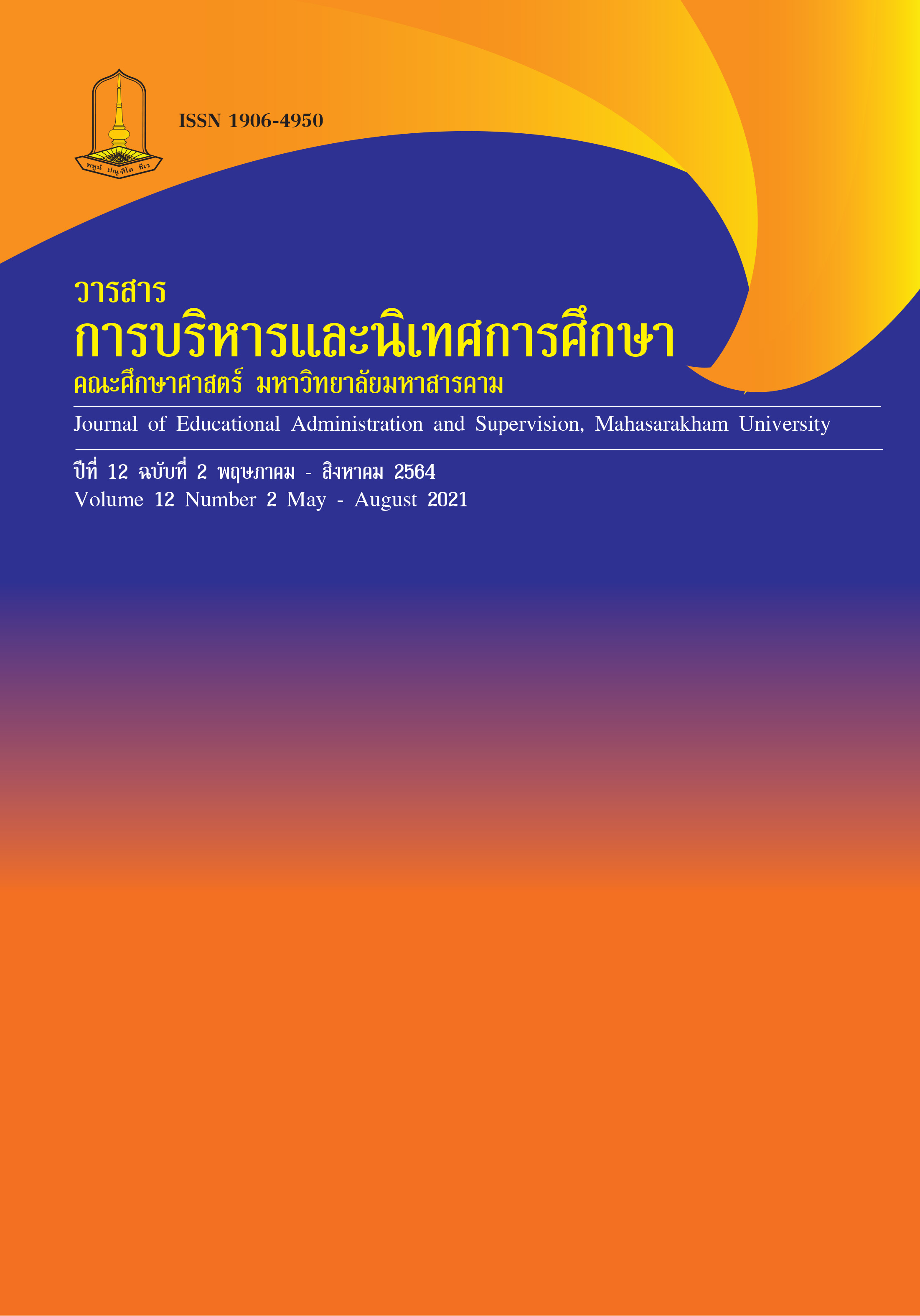Developing a Program to Strengthen Team-Work Competencies of Non-teaching Staff in Faculty of Education, Mahasarakham University
Main Article Content
Abstract
This research aimed: 1) to explore existing situation, desirable situation, and needs to develop team-work competencies of non-teaching staff in faculty of education, Mahasarakham university ; and 2) to develop the program to strengthen team-work competencies of non-teaching staff in faculty of education, Mahasarakham university.
Mixed methods research was employed. The research procedure included two phases: the 1s phase was exploring existing situation, desirable situation, and needs to develop team-work competencies of non-teaching staff in faculty of education. The respondents were 42 non-teaching staff of faculty of education by using 5 rating scales questionnaire ; and the 2nd phase was developing the program to strengthen team-work competencies of non-teaching staff in faculty of education, Mahasarakham university. The program was evaluated to find propriety and feasibility by 9 experts. Statistics used to analyze data were mean, standard deviation, and priority needs index modification.
The research results were as follows:
- The existing situation of team-work competencies of non-teaching staff in faculty of education in overall was at a high level, except the aspect of cooperate goal setting was at a moderate level. While the desirable situation of team-work competencies of non-teaching staff in overall was at the highest level. When each aspect was considered, it was found that almost every aspect was at the highest level, except the aspect of cooperate goal setting was at high level. The needs to develop team-work competencies of non-teaching staff was ranked from high to low were as follow: operate goal setting, operation participation, making good relationship with colleagues, trust and respect, and openly and creatively communication respectively.
- The program to strengthen team-work competencies of non-teaching staff in faculty of education, Mahasarakham university consisted of 1) rationale; 2) objectives ;
content, comprised three main activities that were (1) building awareness and training,
(2) integration of team working in daily task operation, (3) workshop to share and reflect on team working experiences ; 4) activities and development tools ; and 5) program evaluation. The results of program evaluation on propriety and feasibility were at the highest level.
Downloads
Article Details
References
โกวัฒน์ เทศบุตร. (2560). การประเมินความต้องการจำเป็นและแนวทางในการสร้างทีมงานครูโรงเรียน มัธยมศึกษา. วารสารครุศาสตร์ มหาวิทยาลัยราชภัฏมหาสารคาม, 14(1), 295-304.
ธนัย เนียมกุญชร. (2553). สมรรถนะและความต้องการพัฒนาบุคลากรสายสนับสนุนตามทัศนะของ ผู้บริหารและบุคลากรสายสนับสนุนในสังกัดมหาวิทยาลัยราชภัฏเขตภาคเหนือตอนบน.วิทยานิพนธ์ รัฐประศาสนศาสตรมหาบัณฑิต. อุตรดิตถ์: มหาวิทยาลัยราชภัฏอุตรดิตถ์.
บุญชม ศรีสะอาด. (2556). วิธีการทางสถิติสำหรับการวิจัย เล่ม 1. พิมพ์ครั้งที่ 5. กรุงเทพฯ: สุวีริยสาส์น.
พรรณพิตรา เสริมศรี. (2559). การศึกษาความคิดเห็นลักษณะการทำงานเป็นทีมที่มีประสิทธิภาพกรณี ศึกษาข้าราชการสำนักกรรมาธิการ 3 สำนักงานเลขาธิการสภาผู้แทนราษฎร. วิทยานิพนธ์การศึกษามหาบัณฑิต บัณฑิตวิทยาลัย: มหาวิทยาลัยธรรมศาสตร์.
มหาวิทยาลัยมหาสารคาม. (2554). คู่มือหลักเกณฑ์ และแนวปฏิบัติในการประเมินผลการปฏิบัติงานของข้าราชการและพนักงาน, มหาสารคาม: สารคามการพิมพ์.
วิทยา จันทร์ศิริ. (2551). การพัฒนาสมรรถนะหลักของผู้บริหารสายสนับสนุนในมหาวิทยาลัยของรัฐวิทยานิพนธ์ กศ.ด., มหาสารคาม: มหาวิทยาลัยมหาสารคาม.
วิรไท สันติประภพ. (2560) SMEs กับการนำไทยให้ก้าวไกลไปกับโลกยุค 4.0,"
https//www.bot.or.th/Thai/PressandSpeeches/Speeches/Pages/default. aspx สืบค้นเมื่อวันที่ 21เมษายน 2561.
สำนักงานคณะกรรมการขั้นพื้นฐาน. (2553) คู่มือการประเมินสมรรถนะครู กรุงเทพมหานคร: ม.ป.ท.
สุวิมล ว่องวาณิช. (2558). การวิจัยประเมินความต้องการจำเป็น. กรุงเทพฯ: สำนักพิมพ์แห่งจุฬาลงกรณ์มหาวิทยาลัย.
อานนท์ ศักดิ์วรวิชญ์. (2547). แนวความคิดเรื่องสมรรถนะ (Competency) : เรื่องเก่าที่เรายังหลงทาง.กรุงเทพฯ: จุฬาลงกรณ์วารสาร.


